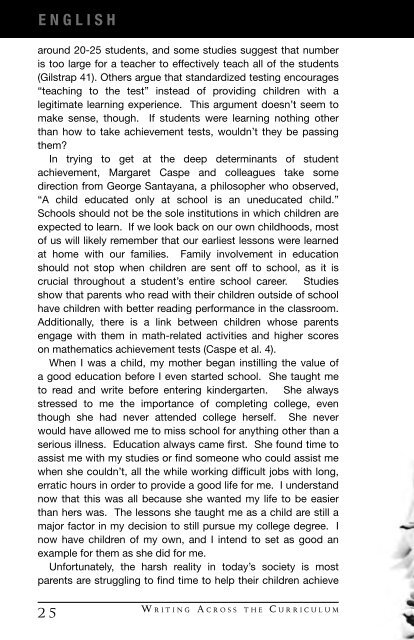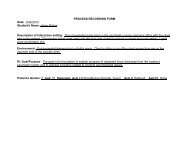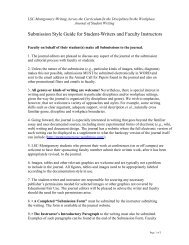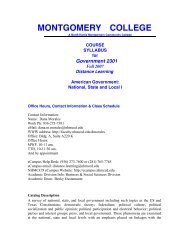2008 - Communication Across the Curriculum (CAC)
2008 - Communication Across the Curriculum (CAC)
2008 - Communication Across the Curriculum (CAC)
Create successful ePaper yourself
Turn your PDF publications into a flip-book with our unique Google optimized e-Paper software.
E n g l i s h<br />
around 20-25 students, and some studies suggest that number<br />
is too large for a teacher to effectively teach all of <strong>the</strong> students<br />
(Gilstrap 41). O<strong>the</strong>rs argue that standardized testing encourages<br />
“teaching to <strong>the</strong> test” instead of providing children with a<br />
legitimate learning experience. This argument doesn’t seem to<br />
make sense, though. If students were learning nothing o<strong>the</strong>r<br />
than how to take achievement tests, wouldn’t <strong>the</strong>y be passing<br />
<strong>the</strong>m<br />
In trying to get at <strong>the</strong> deep determinants of student<br />
achievement, Margaret Caspe and colleagues take some<br />
direction from George Santayana, a philosopher who observed,<br />
“A child educated only at school is an uneducated child.”<br />
Schools should not be <strong>the</strong> sole institutions in which children are<br />
expected to learn. If we look back on our own childhoods, most<br />
of us will likely remember that our earliest lessons were learned<br />
at home with our families. Family involvement in education<br />
should not stop when children are sent off to school, as it is<br />
crucial throughout a student’s entire school career. Studies<br />
show that parents who read with <strong>the</strong>ir children outside of school<br />
have children with better reading performance in <strong>the</strong> classroom.<br />
Additionally, <strong>the</strong>re is a link between children whose parents<br />
engage with <strong>the</strong>m in math-related activities and higher scores<br />
on ma<strong>the</strong>matics achievement tests (Caspe et al. 4).<br />
When I was a child, my mo<strong>the</strong>r began instilling <strong>the</strong> value of<br />
a good education before I even started school. She taught me<br />
to read and write before entering kindergarten. She always<br />
stressed to me <strong>the</strong> importance of completing college, even<br />
though she had never attended college herself. She never<br />
would have allowed me to miss school for anything o<strong>the</strong>r than a<br />
serious illness. Education always came first. She found time to<br />
assist me with my studies or find someone who could assist me<br />
when she couldn’t, all <strong>the</strong> while working difficult jobs with long,<br />
erratic hours in order to provide a good life for me. I understand<br />
now that this was all because she wanted my life to be easier<br />
than hers was. The lessons she taught me as a child are still a<br />
major factor in my decision to still pursue my college degree. I<br />
now have children of my own, and I intend to set as good an<br />
example for <strong>the</strong>m as she did for me.<br />
Unfortunately, <strong>the</strong> harsh reality in today’s society is most<br />
parents are struggling to find time to help <strong>the</strong>ir children achieve<br />
2 5<br />
W r i t i n g A c r o s s t h e C u r r i c u l u m






